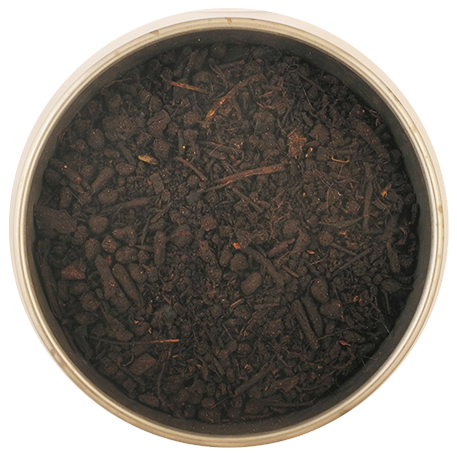The Compostable Capsule
The secret lies in the material used in our plant-based capsules. We make them entirely from sugarcane and sugar beet (sweet, right?). This means that under certain conditions the capsules will fully break-down into compost.
Most coffee capsules use an aluminium sachet to keep the coffee fresh, but we don’t. Aluminium not only leaves a nasty toxic trail after disposal, but is also non-renewable, and requires lots of energy and chemicals to produce. Instead, we have built in a plant-based oxygen barrier to keep our coffee fresh. This means that our entire capsule, can be chewed up, and spat out by our little microbial friends, leaving behind biomass, CO2 and water.
Unlike the plant-based plastics we use, most conventional coffee capsules are made from petroleum-based plastics. Microorganisms cannot digest these materials, and so a bit like us, they stay well clear of them!

How long does it take?
There are many factors that can influence the composting process (like temperature, the time of year, and the location of your bio-bin, just to name a few). In fact, there are so many factors that come into play it’s hard to tell exactly when your used capsules will be fully decomposed. What we can say is that after 12-weeks in an industrial composter, you could pass what’s left of the used capsule through a 2×2mm mesh – we’ve even got our fancy EN13432 certification standard to prove it!
Read about the EN13432 certification standard here.
What’s an industrial composter?
When you put one of our capsules in the organic waste bin it will whisked away for treatment in an industrial compost plant. Here, the conditions are absolutely perfect for the microorganisms to get to work (warm, moist, lots of oxygen), and after a 12-week cycle the microbes will digest the capsules fully.
Do you want to learn more about industrial composting? Watch this video
One week composting

Composting at home
Finding the sweet spot where the microbes in your home compost pile can flourish can be quite tricky. That’s why we recommend putting the used capsules in the organic waste bin and letting the pro’s do their thing at an industrial composting facility. When the used capsules are not in the right conditions then it’s likely that it will take longer for them to break down fully – so please don’t be afraid to chuck them in your bio-bin.
Four weeks composting

Other methods of disposal
If you throw away your used Green Ring coffee capsule in the regular waste bin, then it will end up as either landfill, incinerated, or recycled. Take your pick, because all three routes will have less of a negative environmental impact than your standard coffee cap.
In landfill, petroleum-based plastic and aluminium are highly pollutant and can potentially leak nasty chemicals into the soil and water. PLA has a much lower negative impact in landfill, because it’s 100% plant-based. If it’s not landfill, it’s likely the PLA capsules will be incinerated in a large industrial furnace. Now, this isn’t all as bad as it sounds. The high energy content that is released from the PLA can be converted into heat and electricity. And unlike with aluminium and petroleum-based plastics, this can be done safely without the risk of releasing polluting dioxins into the air (a bit of a win-win).
However, if you want to see the PLA re-entering the cycle as quickly as possible, the conditions in landfill just aren’t going to cut it. The microbes that make this magic happen are notoriously fussy about where (and what) they’ll decompose. That’s why we see a much slower rate of decomposition in landfill, compared to under industrial composting conditions. Here the microbes are pampered beyond belief with all the warmth, oxygen and moistness they’ll could ever need. That’s why we recommend you throw you caps in the bio-bin.
Nine weeks composting

Recycling the coffee capsules
PLA can actually be recycled back into lactic acid pellets and then reused to make new products. In order for a standard coffee capsule to be recycled the plastic capsule and the foil sachet need to be separated, otherwise the plastic and aluminium cannot be re-used. Instead new plastics must be produced, only to follow the same cradle-to-grave lifecycle.
An important rule to remember when recycling is that you should never mix your plastics. When you’re doing your recycling you should try and resist the urge to put our coffee capsules in with the standard (petroleum-based) plastics (like PET bottles or plastic bags). They have a different chemical structure. So when they are mixed it can reduce the quality of the recycling process, and can lead to plastics being discarded rather than recycled. At this moment in time, however, because there are so few plant-based plastics in circulation, they have no significant impact in the recycling system.

